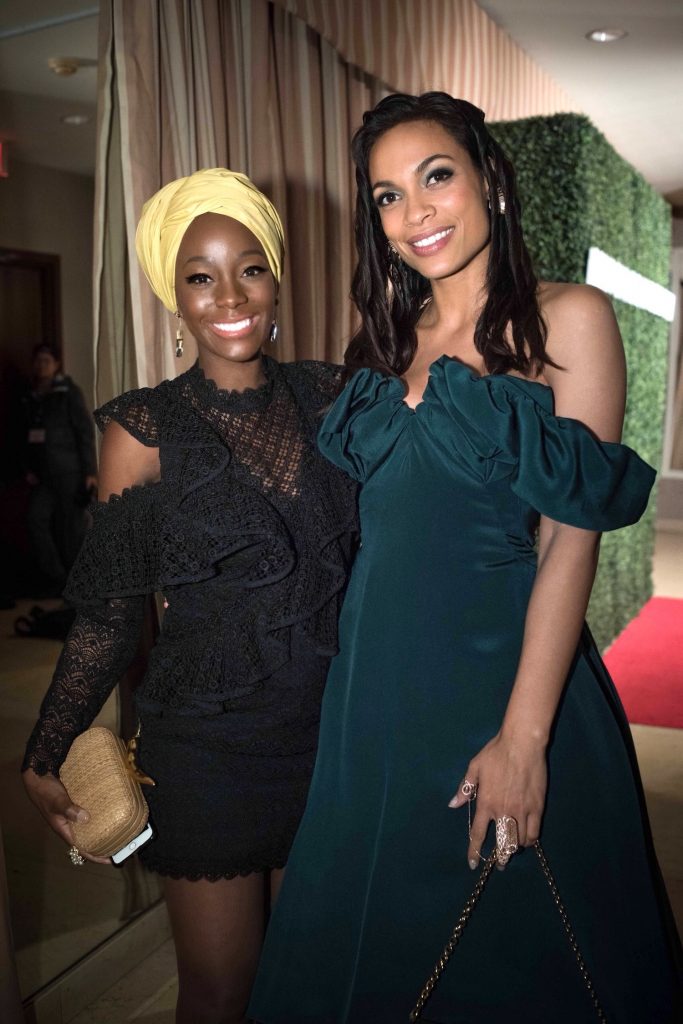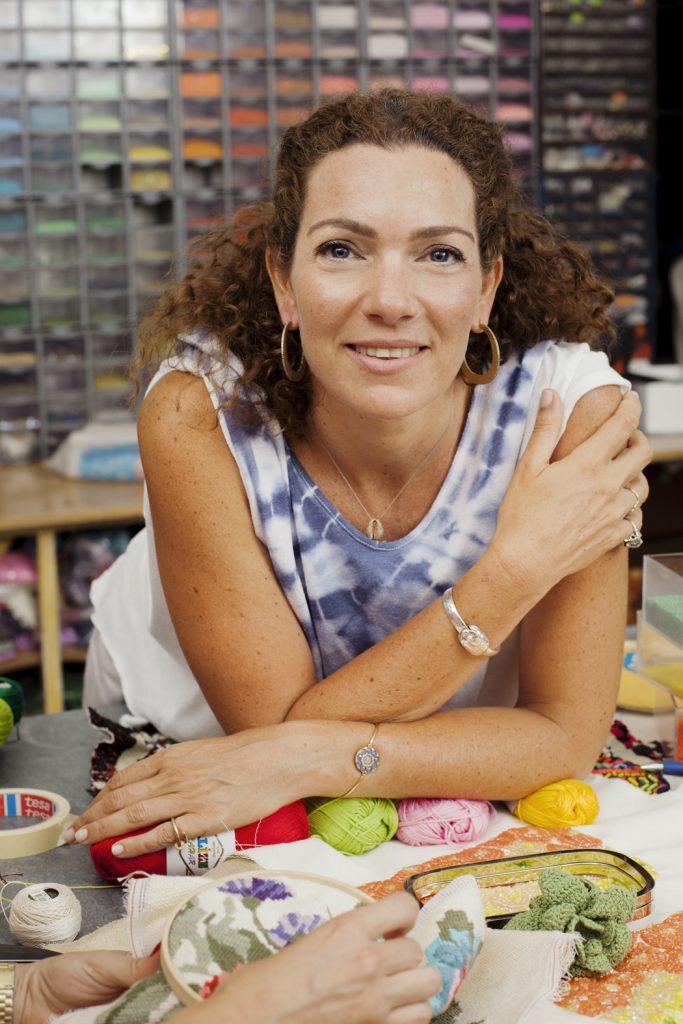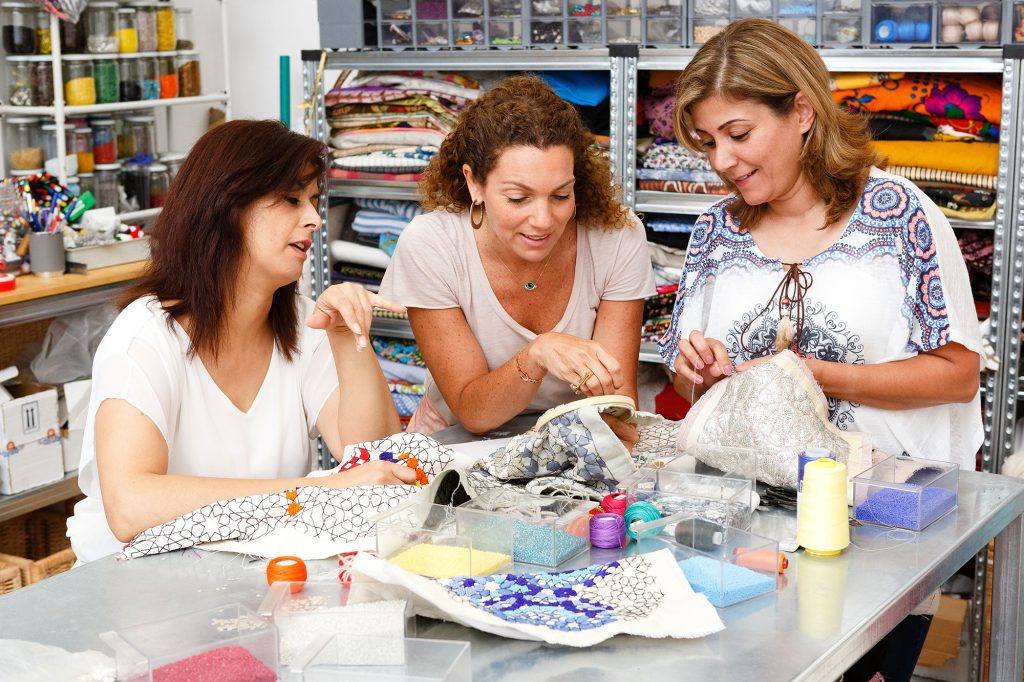We have posted about this incredible brand before and were over the moon when Sarah’s Bag founder Sarah Beydoun shared some insight into her story with us. Beydoun is a passionate entrepreneur and leader, with a brand dedicated to empowering women. Have a look at what she had to say about her incredible brand below…
Please introduce yourself and tell us a little about your brand
I am the founder and creative director of Sarah’s Bag, a fashion house and social enterprise I launched while finishing a master’s degree in sociology in 2000. At first, Sarah’s Bag was set up as a rehabilitation project for female prisoners in Lebanon. I started by working with a group of inmates at Baabda women’s prison trained in beading, embroidery and sequinning. These women became the artisans who create the signature handwork and decorative elements on our handbags and accessories. Over the almost 18 years we’ve been in business, our team of artisans has grown to 200 women to include prisoners, ex-prisoners and underprivileged women in Lebanon. While our Lebanese and Middle Eastern roots are often reflected in our collections (something we are very proud of), over the years we worked to build an international following, and Sarah’s Bag is now available in over 20 countries around the world.
Tell us about the vision for your brand?
I would like Sarah’s Bag to be the best luxury handbag and accessories label in our region, as well as its leading social enterprise. We want to be a positive example for fashion entrepreneurs in the region to consider social enterprises as win-win business models that can help tackle difficult social issues.
How do you approach sustainability/transparency within your brand?
Here in Lebanon and in the Middle East in general, this is still a tiny niche in the fashion industry. We don’t have a standardized system of certification of what constitutes as sustainable and environmentally sound business practices. There are a lot of traditional production methods that haven’t yet evolved to take the environment into consideration. In addition, sourcing eco-friendly fabrics from abroad is quite costly. However, we do work within a broad framework of sustainability by implementing environmental policies starting with of course recycling at our offices, atelier and flagship boutique in Beirut and sourcing our raw materials locally as much as possible. We also remain true to our mission as a social enterprise that empowers underprivileged women to be financially independent, capable of supporting their families and giving their children a better future.
How do you ensure quality with your brand?
Each one of our products is checked by our quality control team, they make sure it is perfect before we show it at our flagship boutique in Beirut or ship it abroad.
How do you ensure transparency within your business or that you are communicating this with your customers?
We often host open days when we invite clients and the press to meet the women we work with at the atelier and to meet our artisans. We also work with prisoners through a local NGO called Dar Al Amal. Their team ensures the women are doing their jobs and that we are paying them in return.
What more do you think customers are looking for these days beyond good design? Or do you think that design is really all that matters?
Thankfully we are seeing a new generation of consumers who want to know more about the products they’re buying: Where and how are they made? Where are the raw materials sourced? Who made them and under what conditions? Is the company environmentally friendly and sustainable? Companies today care a lot about their reputation, and because of social media they are being held accountable.
This is not to say that companies can compromise on design; a company cannot grow on pity purchases, there needs to be a balance between the two. In our case customers are drawn to our designs first and then fall in love with the story behind Sarah’s Bag.
I hope more and more consumers move towards brands that are social enterprises or ones that basically put people and planet on par with profit. I would also like to see more of a shift where consumers shop more for quality, craftsmanship and uniqueness rather than buying mass-produced fast fashion to follow short-lived trends.
What were the biggest challenges you faced when trying to grow your brand?
Setting up the Sarah’s Bag and taking it from a rehabilitation project to full-fledged business was definitely a huge challenge. We had to put together a core team of artisans from amongst the initial group of female prisoners trained in handwork skills at Baabda prison. I used to go to the prison three times a week to work with them on our latest designs. It took time to develop a reliable group of artisans because some of the women were traumatized, brutalized or depressed; each one had a situation she was dealing with. Sometimes deadlines were not met, the work was not consistent but eventually, with time, we were able to form a good team. In fact some of the women from that first group of artisans are still working with us today, 18 years later, producing work of exquisite quality and artistry. This for me is one of our greatest challenges that we turned into a success.
Why was working with women in the way that your brand does so important to you?
As I mentioned, my initial interest was to help underprivileged women in my country reset their lives, and out of the desire to create a sustainable project that could help them came the idea for Sarah’s Bag. So our entire brand is built around working with women; it’s not just a policy!



Comment (1)
Eleanor O'Neill says May 23, 2018 at 1:15 pm
Such a cool brand – I’d never heard of them before and just checked them out! Amazing, love the straw designs and the ones with the chillies!